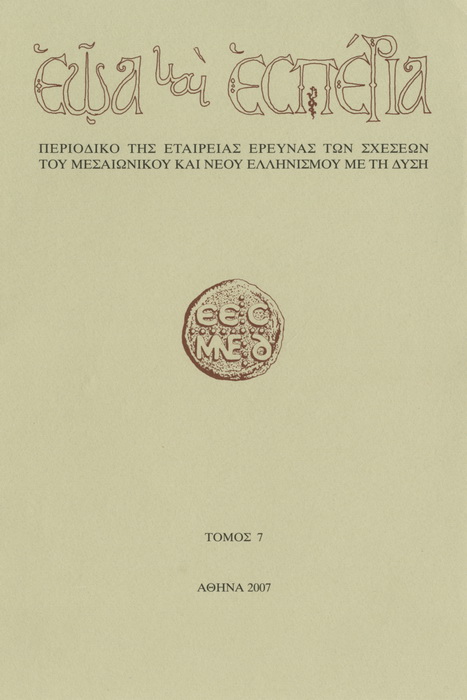ΑΝΤΙ ΠΡΟΛΟΓΟΥ: ΟΙ ΚΟΙΝΟΤΗΤΕΣ ΤΗΣ ΕΛΛΗΝΙΚΗΣ ΧΕΡΣΟΝΗΣΟΥ ΚΑΤΑ ΤΗΝ ΤΟΥΡΚΟΚΡΑΤΙΑ. ΜΙΑ ΑΠΟΠΕΙΡΑ ΣΧΗΜΑΤΙΚΗΣ ΚΑΤΑΤΑΞΗΣ ΣΤΟΝ ΧΩΡΟ, ΚΑΤΑ ΤΗΝ ΕΣΩΤΕΡΙΚΗ ΟΙΚΟΝΟΜΙΚΗ ΚΑΙ ΠΟΛΙΤΙΚΗ ΤΟΥΣ ΛΕΙΤΟΥΡΓΙΑ
Περίληψη
Λεπτομέρειες άρθρου
- Πώς να δημιουργήσετε Αναφορές
-
ΕΥΘΥΜΙΟΥ Μ. (2007). ΑΝΤΙ ΠΡΟΛΟΓΟΥ: ΟΙ ΚΟΙΝΟΤΗΤΕΣ ΤΗΣ ΕΛΛΗΝΙΚΗΣ ΧΕΡΣΟΝΗΣΟΥ ΚΑΤΑ ΤΗΝ ΤΟΥΡΚΟΚΡΑΤΙΑ. ΜΙΑ ΑΠΟΠΕΙΡΑ ΣΧΗΜΑΤΙΚΗΣ ΚΑΤΑΤΑΞΗΣ ΣΤΟΝ ΧΩΡΟ, ΚΑΤΑ ΤΗΝ ΕΣΩΤΕΡΙΚΗ ΟΙΚΟΝΟΜΙΚΗ ΚΑΙ ΠΟΛΙΤΙΚΗ ΤΟΥΣ ΛΕΙΤΟΥΡΓΙΑ. Ἑῶα καὶ Ἑσπέρια, 7, 239–245. https://doi.org/10.12681/eoaesperia.93
- Τεύχος
- Τόμ. 7 (2007)
- Ενότητα
- GREEK COMMUNITIES AND EUROPEAN WORLD (13TH-19TH C.). PATTERNS OF SELF-ADMINISTRATION, SOCIAL ORGANIZATION, IDENTITIES
Οι συγγραφείς των άρθρων που δημοσιεύονται στα Ἑῷα καὶ Ἑσπέρια διατηρούν τα δικαιώματα πνευματικής ιδιοκτησίας επί των άρθρων τους, δίνοντας στο περιοδικό το δικαίωμα της πρώτης δημοσίευσης. Άρθρα που δημοσιεύονται στα Ἑῷα καὶ Ἑσπέρια μπορούν να χρησιμοποιούνται ελεύθερα, χωρίς δικαίωμα τροποποίησης (δημιουργία παράγωγου έργου) με αναφορά στον/στη συγγραφέα και στην πρώτη δημοσίευση για μη κερδοσκοπικούς σκοπούς. Η Εταιρεία Έρευνας των Σχέσεων του Μεσαιωνικού και Νέου Ελληνισμού με τη Δύση διατηρεί το δικαίωμα να δημοσιεύει, να αναπαραγάγει, να παρουσιάζει στο κοινό, να διανέμει και χρησιμοποιεί άρθρα που δημοσιεύονται στα Ἑῷα καὶ Ἑσπέρια σε οποιοδήποτε μέσο και μορφή είτε μεμονωμένα είτε ως μέρη συλλογικών έργων, για όλο τον χρόνο διάρκειας προστασίας της πνευματικής ιδιοκτησίας και για όλες τις χώρες του κόσμου. Αυτό περιλαμβάνει ενδεικτικά και όχι αποκλειστικά το δικαίωμα δημοσίευσης των άρθρων σε τεύχη του περιοδικού Ἑῷα καὶ Ἑσπέρια, αναπαραγωγής και διανομής μεμονωμένων αντιγράφων των άρθρων, αναπαραγωγής ολόκληρων των άρθρων σε άλλη έκδοση της Εταιρείας Έρευνας των Σχέσεων του Μεσαιωνικού και Νέου Ελληνισμού με τη Δύση, καθώς και αναπαραγωγής και διανομής των άρθρων ή περίληψης αυτών με χρήση πληροφορικού συστήματος αποθετηρίου.



